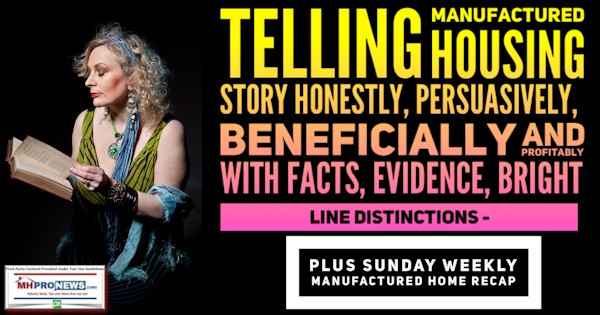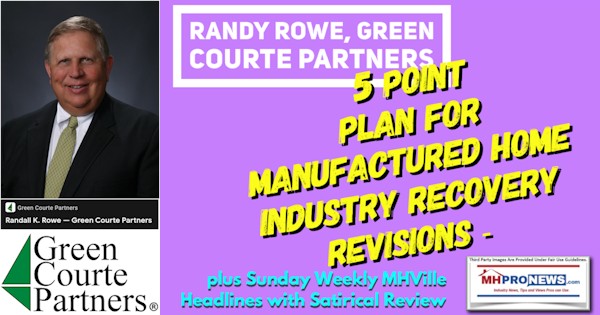
A sharp critic of the Manufactured Housing Institute (MHI) called MHProNews to express the good, bad, and ugly about what has been occurring on that battle front. On paper, MHI seems to be doing some good things. That insider critic who has long ties to the Arlington, VA based trade group said as much. That party encouraged this publication to give a tip of the hat to what good has been done by MHI. Fair enough, and entirely in keeping with MHProNews’ longstanding approach of providing several sides of an issue so that readers can sort the evidence for themselves and draw their own conclusions. That “We Provide, You Decide” © tag line or mantra has never gone away. That noted, MHI’s media engagement, political engagement, Homes on the Hill as part of the broader National Association of Home Builders and HUD sponsored Innovative Housing Showcase June 10-12, 2022 are arguably all examples that can be taken in a positive as well as a problematic light, as reports below for this week in review exemplify.
On Sunday mornings or early afternoons, mainstream cable and TV networks routinely for years have talk shows where the host and often others discuss the hot topics for the week that was. They may also look ahead to ‘newsmakers’ and get input on current or looming issues. MHProNews has borrowed that pattern from legacy journalism in this once weekly report and recap, in which we may feature an issue(s) important to manufactured housing, while placing the topic in the context of other issues recently covered.
This third-party video from the recent IHS 2022 event features tiny houses, structural building systems, 3D Printed houses, and manufactured homes. This video’s YouTube page had the following explanation: “Official event description: The Innovative Housing Showcase is a three-day event featuring new building technologies and housing solutions that are making housing more innovative, resilient and affordable for American families. More than 2,500 people, including policymakers, housing industry representatives, media, and the general public, are expected to attend.”
Manufactured housing was shown in that third party video, but other options were given more attention. Note that MHI wasn’t specifically mentioned in this video above. This video by HUD mentions MHI only in the closing screen via the collage of logos of organization that took part.
Small Biz Trends aptly noted in an article that mentions the Innovative Housing Showcase 2022 that “And a troubled housing market is a bad sign for the economy.” Objectively and editorially speaking, that is quite so. For whatever reasons, IHS 2022 didn’t seem to get as much mainstream media attention as IHS 2019 did. Note in this Google news category search that Bloomberg appears, but in 2019 ABC News, Epoch Times, Fox, and other sources – local and trade media – were among those that covered the event with HUD Secretary Carson and NAHB kicked it off.
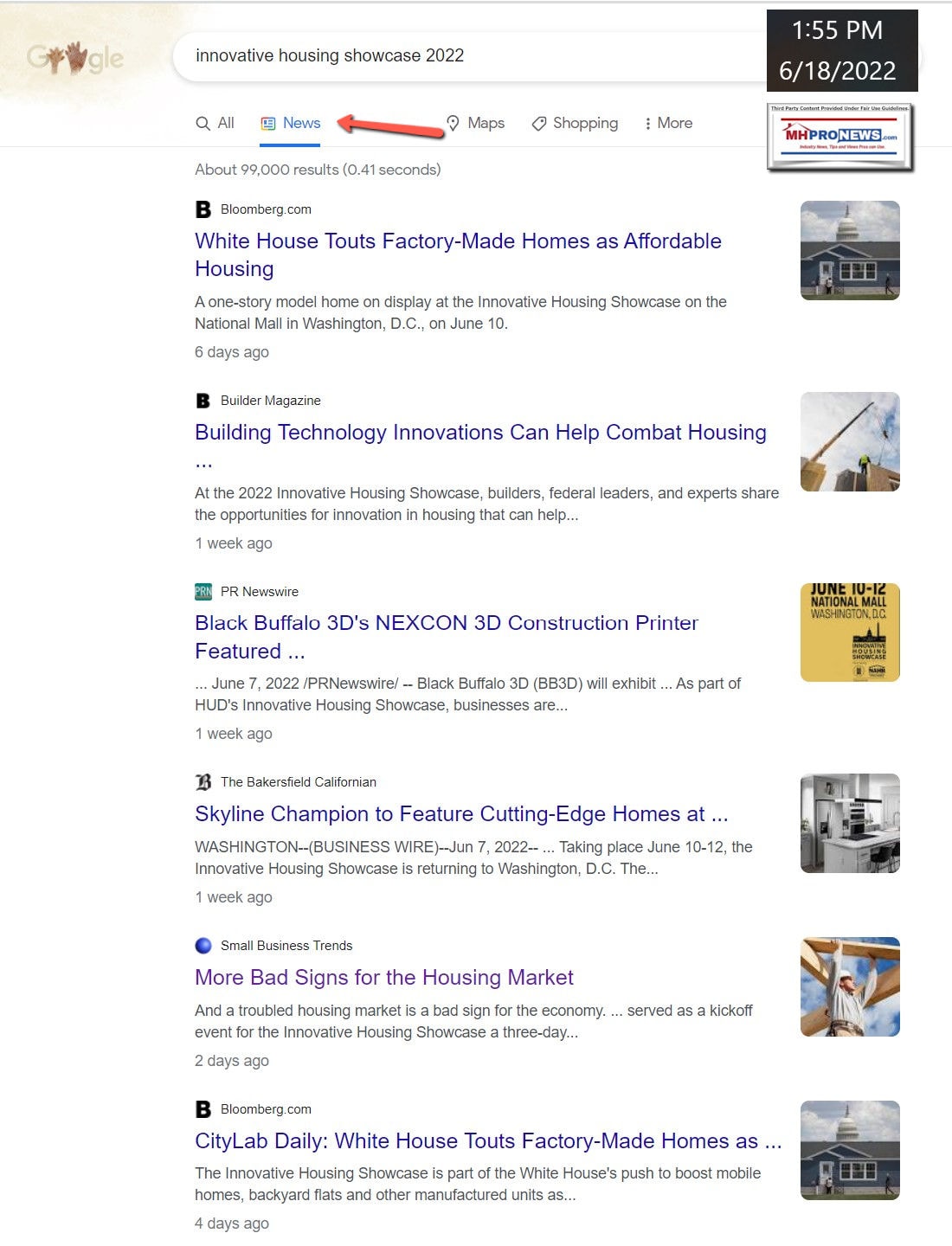
Per Small Biz Trends June 16, 2022 report on IHS: “According to the National Association of Home Builders/Wells Fargo Housing Market Index, released June 15, builder confidence in the market for newly-built single-family homes posted its sixth straight monthly decline, falling to a 67 rating. That’s the lowest HMI number since June 2020.”
That same report noted that: “Rising inflation and higher mortgage rates are slowing traffic of prospective home buyers and putting a damper on builder sentiment.
“Six consecutive monthly declines for the HMI is a clear sign of a slowing housing market in a high inflation, slow growth economic environment,” said NAHB Chairman Jerry Konter, a builder and developer from Savannah, Ga. “The entry-level market has been particularly affected by declines for housing affordability and builders are adopting a more cautious stance as demand softens with higher mortgage rates.”
“Government officials need to enact policies that will support the supply-side of the housing market as costs continue to climb,” Konter added.
But then comes the kicker, quoting HUD Secretary Marcia Fudge, who is obviously fresh from the IHS 2022 event: “We need to rethink housing,” said Secretary Fudge. “If we do not address the housing crisis right now, we all will have failed.”
It went on to say:
The meeting [with Fudge and NAHB], held at the National Building Museum in Washington, served as a kickoff event for the Innovative Housing Showcase a three-day event on the National Mall featuring new building technologies and housing solutions to make housing more innovative, resilient and affordable for American families.
NAHB Chief Economist Rob Dietz said housing issues need to be immediately addressed.
“We have a persistent housing deficit in the country and the costs to build are going up,” Dietz said. “The time to address these issues is now, and we need to address them with market solutions and government policy changes.”
“Residential construction material costs are up 19% year-over-year with cost increases for a variety of building inputs, except for lumber, which has experienced recent declines due to a housing slowdown,” Dietz said. “On the demand-side of the market, the increase for mortgage rates for the first half of 2022 has priced out a significant number of prospective home buyers, as reflected by the decline for the traffic measure of the HMI.” …##
Doesn’t that report sound like a far cry from the “momentum” that MHI was touting to their members in a message found in the report linked below? When it comes to association representation, look at the NFIB report further below, and compare their facts and advocacy to that of MHI.
But more recently, MHI said the following. In an email to members provided to MHProNews by a third-party, because MHI has opted not to share their news with this platform directly, MHI provided videos that were not apparently posted on YouTube. The trade group did so along with the following text. The glitch in the official dates below for the Homes on the Hill and IHS are a screen capture, so they are clearly in MHI’s original. While every publication and organizations, including this one, has glitches, they have about 12 times the staff. One might wonder what their pre-release process is when simple errors go unnoticed, so what does that say about the trade group on tougher or more complex issues?
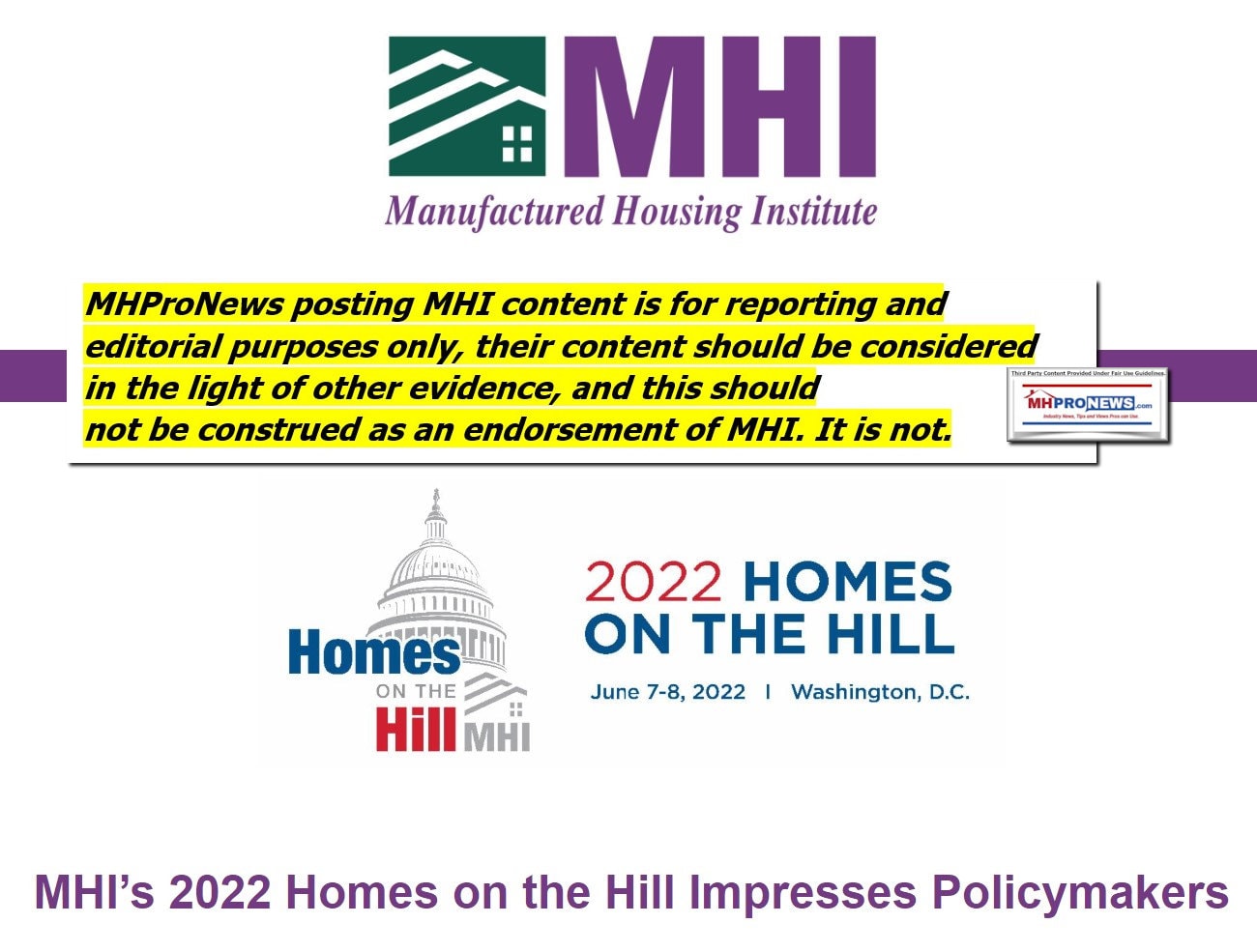
|
|
|
That part of the email links to a document archived by MHProNews at this link here as well as the link in the MHI emailed message, above.
That MHI document says in part: “HUD Should Regulate Manufactured Housing Energy Standards” – which might well draw an ‘amen’ from their colleagues across the Potomac River in Washington, D.C. Namely, the Manufactured Housing Association for Regulatory Reform (MHARR).
But the evidence linked herein and elsewhere suggests that MHI has regrettably disproven numerous times the odd claim asserted by their outside counsel, David Goch. Namely, that MHI seeks a ‘robust discussion’ and ‘all points of view.’ That notion with respect to MHI’s behavior is demonstrably nonsense.
That assertion by Goch was either based on ignorance or was/is a pure fabrication – a possible lie – again, based on evidence often explored and which MHI and their attorney Goch have never directly challenged. That is despite both being given the opportunity to do so numerous times. So, a prima facie case has been made that MHI leaders wants to forge a ‘party line’ on their advocacy that they want others to mimic as closely as possible.
Nor does MHI mention that dating back to at least 2014, MHI worked directly with DOE in behind-the-scenes negotiated rule making with that agency. If they wanted HUD to regulate energy, why didn’t they file their proposed bill sooner? Why didn’t MHI offer up this legislation through both Democratic and Republican lawmakers year ago, perhaps during the Trump Administration? Why offer a bill during the Biden Administration, which is ‘all in’ on green energy interests?
Back to the balance of MHI’s recent email to members.
|
|
In her opening remarks kicking off HUD’s Innovative Housing Showcase, Secretary Fudge said “today is the beginning of solving the country’s affordable housing challenge” and recommitted her agency to “utilizing innovative housing solutions to address the problem” including manufactured housing. |
|
||||||||||
|
The Homes on the Hill is potentially a fine project and offers potential benefits from the industry’s perspective. But how has that opportunity been handled by MHI? How did the current event compare to a prior iteration – likely the original one – that involved Skyline Homes back during the transition phase from the mobile home era into HUD regulated manufactured housing?
MHProNews put that topic to Danny Ghorbani, who was a point-man for MHI as an association vice-president at that time. Ghorbani was deeply involved in marketing for MHI at trade shows like the Louisville Manufactured Home Show. That occurred in the glory days when the Louisville Show was an event that attracted an international audience as well as mainstream news media coverage. Because of roughly 5 decades of experience in the mobile homes transition into manufactured housing that Ghorbani uniquely has, MHProNews has periodically turned to him for historical insights and context. Those interviews with RV MH Hall of Fame winner Ghorbani have been archived by MHARR with our publication’s permission at this link here.
MHProNews emailed an inquiry to Danny Ghorbani:
- Please share your perspective and experience that compares and contrasts the recent Innovative Housing Showcase (IHS 2022) and the so-called Manufactured Housing Institute (MHI) Homes on the Hill to a prior event that occurred in the 1970s when Skyline Homes placed factory-built homes near the U.S. Capitol Building and the National Mall in Washington, D.C.
Ghorbani emailed reply to MHProNews, with the bracketed comments and links below added by MHProNews to illustrate his points and provide supportive evidence for his remarks.

Ghorbani to MHProNews:
“Please wake me up the first time one of these national officials, and more specifically a HUD Secretary actually takes action to correct a discriminatory and/or exclusionary zoning law against manufactured housing and, in fact, advances our homes that it regulates, certifies and fully controls. Remember, Jack Kemp was the HUD Secretary who correctly identified and coined the phrase NIMBY (Not In My Back Yard) for this problem in a report to then President George H.W. Bush. [POTUS 41-R]. Here we are decades later, and HUD hasn’t done anything of substance to correct the NIMBY problem…even after we gave HUD the additional power and authority with the “Enhanced Preemption” provision of our 2000 Reform Law [i.e.: the Manufactured Housing Improvement Act of 2000].
The bottom line is that when we erected and staged the HOUSE ON THE HILL as our industry’s very first exclusive “village” (i.e., not as a second fiddle to site builders and NAHB) in Washington, D.C. in 1970s, there were very sound and badly needed reasons and purposes for our industry (by then, a comprehensively federally regulated industry) to showcase its products in the nation’s capital. In part, these were to educate the U.S. Congress, government agencies, and other decision-makers about our then-latest homes which were being offered to the public at large. We did that because:
1- The industry had completed its transition from “trailers” to “mobile homes;”
2- The 1974 federal law was in its third year of implementation, and HUD was already moving on the wrong track enforcing it;
3- We wanted to make sure that Congress, government agencies, and all other decision-makers would accord our manufactured homes full parity with all other types of housing in all federally supported, assisted and funded housing, mortgage and finance programs.
And the evolutionary history of our industry clearly shows that, thanks to the creation of MHARR in 1985, not only many of those purposes were achieved, but, in the process, we also discovered that the 1974 federal law was badly flawed and in dire need of comprehensive reform to address today’s modern, quality, energy efficient, and affordable manufactured homes. That was in conjunction with reform of existing law and new laws needed for manufactured home consumer finance.
The fact of the matter is that none of those badly needed reasons and purpose exists today because Congress has mandated great laws for production, marketing, and consumer financing of our industry’s modern manufactured homes.
In short, Congress has generously done its job for our industry and our consumers…we made sure of that. That said, the only other thing that Congress can and should do is Congressional Oversight Hearings, which the industry (i.e., its so-called post-production representation) is scared to death to ask for, but that is a story for another time.
So, the continuing failure of full and proper implementation of these great laws by our industry has blunted and stymied the growth of manufactured housing.
And while a good dog and pony show is always a welcome event in the nation’s capital, the industry has much bigger fish to fry these days.
Therefore, the industry must keep its collective eye on the big prize, which is first and foremost the full and proper implementation of its existing laws, particularly as they pertain to discriminatory and/or exclusionary zoning laws and consumer finance, all of which we worked and fought so hard to achieve, but continue to languish unused.
As I have said many times before, posturing, public relations, photo-ops, rubbing shoulders, big talks, etc. are cheap and low-hanging fruits that are easy to pick…but what our industry and our consumers desperately need is heavy-lifting, hard work, fighting spirit, tough and aggressive attitude and productive ACTION(S), which, unfortunately, is not happening as of yet because of the incompetence of those who are entrusted by the hardworking and trusting members of our manufactured home industry to advance them.”
An additional document from HUD from the 1970s that supports Ghorbani’s historic insights are found at this link here. See the segment, for example, starting at page 194 in HUD’s report. These linked federal records that support his statements are part of the factual and evidence-based insights that make his commentary so useful. Because they are accurate, there is no need for the type of BS that others may shovel just because it sounds good. It is also an example of the value of institutional memory, something that MHI’s current staff lacks, but something that MHARR is comparatively long on.
MHProNews plans to revisit this Q&A with Ghorbani in greater depth in the days ahead.
But until then, do not miss today’s postscript, and see how the insights from MHI, from MHI’s former VP and MHARR’s founding president and CEO above rounds out the picture that emerges from the various reports that follow in our weekly headlines in review.
With no further adieu, let’s pivot to the headlines for the “Industry News, Tips, and Views Pros Can Use” © found in the reports that follow dated from 6.12.2022 to 6.19.2022.
What’s New on MHLivingNews
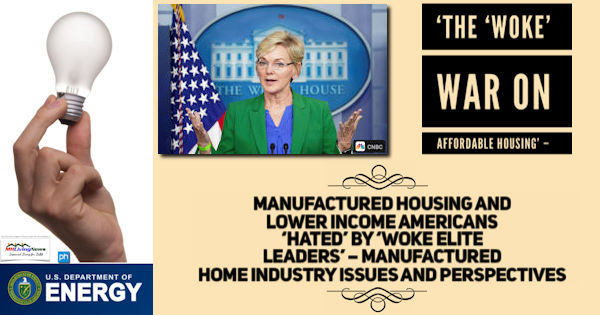

What’s New on the Words of Wisdom, by Tim Connor, CSP

What’s New From Washington, D.C. from MHARR
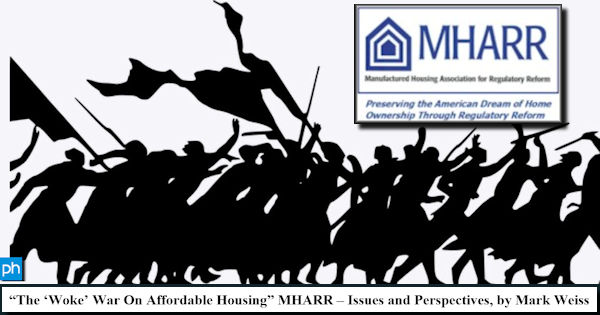
The Latest on the Masthead

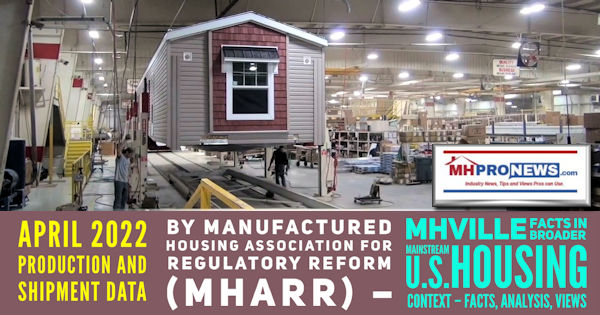
What’s New on the Daily Business News on MHProNews
Saturday 6.18.2022
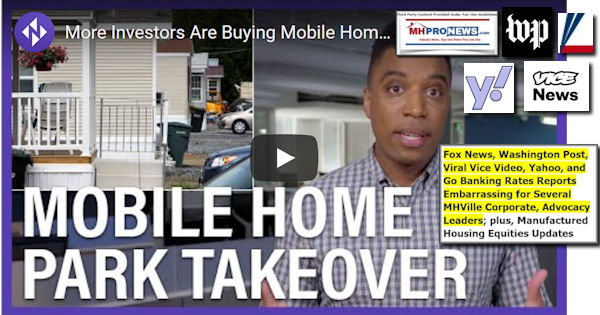
Friday 6.17.2022
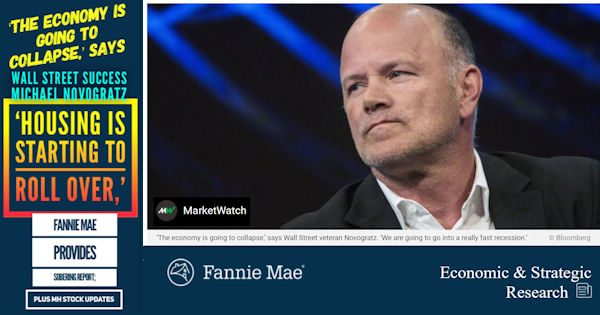
Thursday 6.16.2022
Wednesday 6.15.2022
Tuesday 6.14.2022
Monday 6.13.2022
Sunday 6.12.2022
Postscript – More MHProNews Facts, Analysis and Viewpoints
As a senior corporate member of MHI told MHProNews this past week, there are plenty of opportunities for robust growth for the manufactured housing segment of the broader housing industry.
Ghorbani’s viewpoints, shared above, amplify that point. But they also show the reverse side of that equation. The industry is poised for possible growth. But that potential has been “blunted and stymied” by failures at MHI.
MHProNews will note that Ghorbani has previously said that MHI, which has claimed the mantle of representing “all segments” of the industry, and thus the post production segment of the industry, is logically alone in its responsibility for success or failure in advocacy in that post-production realm. Ghorbani has previously told MHProNews in a prior Q&A that MHI should be using its financial and legal resources to get the existing laws he spoke about above fully and properly implemented.
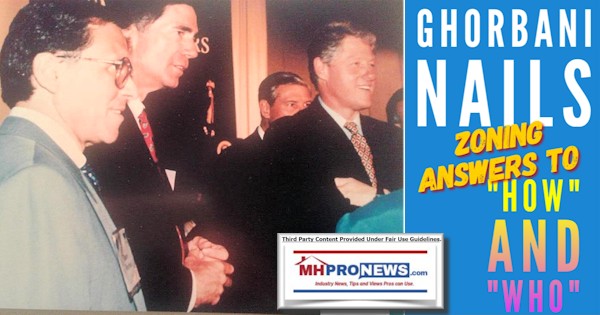
When MHProNews was an MHI member, this writer asked Tim Williams – then and now President and CEO of Berkshire Hathaway owned 21st Mortgage Corporation, a sister brand to Clayton Homes – during an MHI meeting with dozens of other MHI/industry members present a simple question.
- ‘Why MHI hasn’t used litigation to compel HUD to enforce its enhanced preemption authority?’
Williams smiled and said that at some point litigation may become necessary. But the trade association had other things short of litigation that MHI wanted to attempt first. Fair enough, perhaps.
But isn’t a decade more than enough time for MHI and its corporate masters to realize that all of its other efforts short of litigation have failed to advance the issues that MHI admits are still not properly implemented?
- It is MHI’s own (now) CEO – Lesli Gooch, Ph.D. – who has said that “enhanced preemption” is unenforced. So, on paper, MHI and MHARR seem to be on the same page. Isn’t some 22 years enough time to wait for other things MHI has tried (and apparently failed) to realize that robust litigation ought to be the next step?
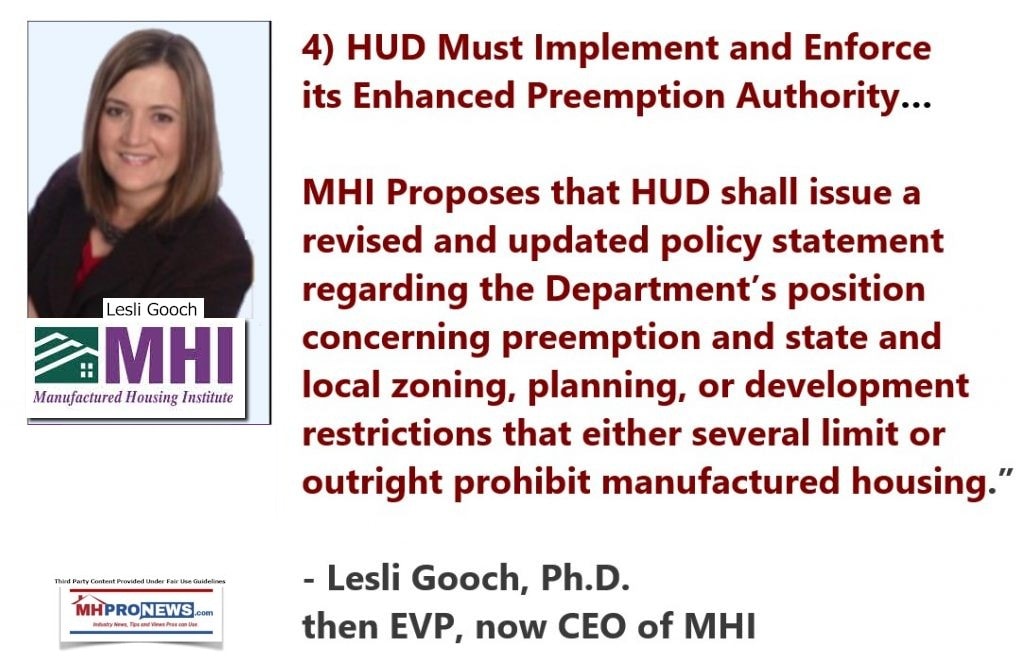
- 2. It is MHI’s Gooch who has admitted that DTS on chattel lending is not been achieved, even though some 14 years have elapsed since that law went into effect. When will MHI realize that litigation has to be the next step on DTS too, and perhaps Ginnie Mae and the elimination of the 10/10 rule, too?
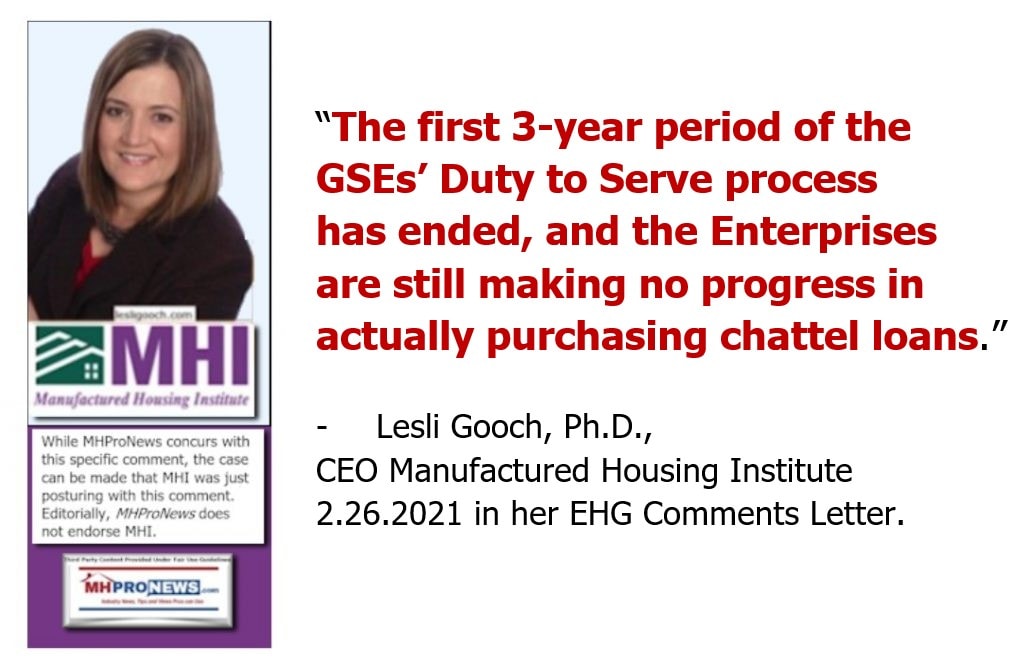
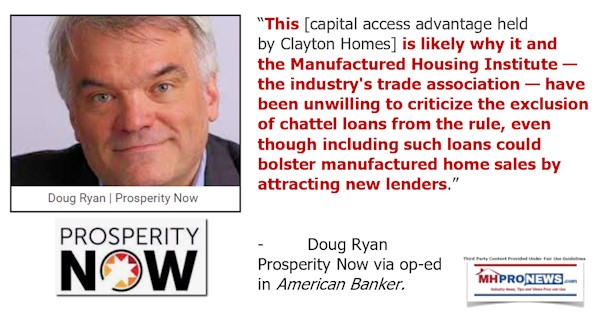
- 3. Last for now is the countdown clock on the DOE manufactured housing energy rule. MHI has ironically admitted that it was the Louisiana vs. Biden suit by state attorneys general that caused a few weeks of delay in what is DOE’s published final manufactured housing energy rule. Logic and common sense should make it clear that if litigation has produced limited success before, it might provide even more success if it is robustly engaged in by MHI. So what excuse does MHI have for not engaging their legal muscle and other resources in an effort to stop a rule they admit will harm homebuyers and industry professionals?

While manufactured housing industry professional ideally ought to press its rights on all of these key issues and should use an ‘all of the above’ strategy of congressional oversight, media relations, litigation, etc. a case could be made that MHI might prioritize “enhanced preemption” and the DOE manufactured housing energy rule litigation first. Legal efforts by MHI on DTS, Ginnie Mae/FHA Title I, etc. could – and should – follow later.
But an all of the above approach can and should be pressed by MHI now, IF MHI leaders are sincere (vs. if MHI leaders not merely posturing and paltering while masking a different agenda than the one they have stated).
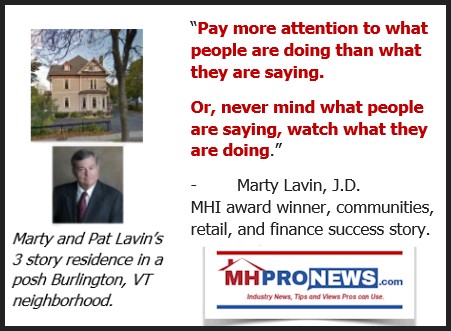
After 22 and 14 years respectively have elapsed since Congress passed the good laws that Danny Ghorbani referenced above, it makes no sense whatsoever for MHI to ignore the legal option in stopping the DOE energy rule. This is particularly true, logically, given that MHI is arguably at least partially responsible for the current state of that onrushing regulation (see the related reports linked herein and from them for evidence of that statement).
MHI has contradicted several principles and positions previously or recently laid out.
If, as MHI critics believe, the Arlington, VA based trade association is only posturing efforts and paltering while slyly working for the industry’s consolidation by its major brands, then their actions make sense.
But if MHI is sincere in saying that they want to see enhanced preemption, the DOE energy rule stopped, and DTS enforced, then their behavior past and recent makes no sense.
- A) MHI has for years demonstrated its access to public officials during both Democratic and Republican Administrations. As the Biden-Harris 2020 campaign website indicated, access to public officials is a kind of currency in Washington, D.C. Since MHI has proven access with their photo and video opportunities, why have they failed to press in a public way HUD Secretary Fudge, DOE Secretary Granholm, or FHFA Director Sandra Thompson to get their respective agencies to properly deal with manufactured housing, in each instance based upon a proper application of existing laws? As a MHEC executive previously told MHProNews, what is occurring has been a case of ‘association malpractice.’
- B) MHI’s outside attorney Goch has made it clear that they are willing to sue those who disparage the association’s supposedly good name. If so, aren’t MHI leaders willing to use those legal resources to sue and thereby push HUD, local officials, or DOE to do what MHI claims they want done?
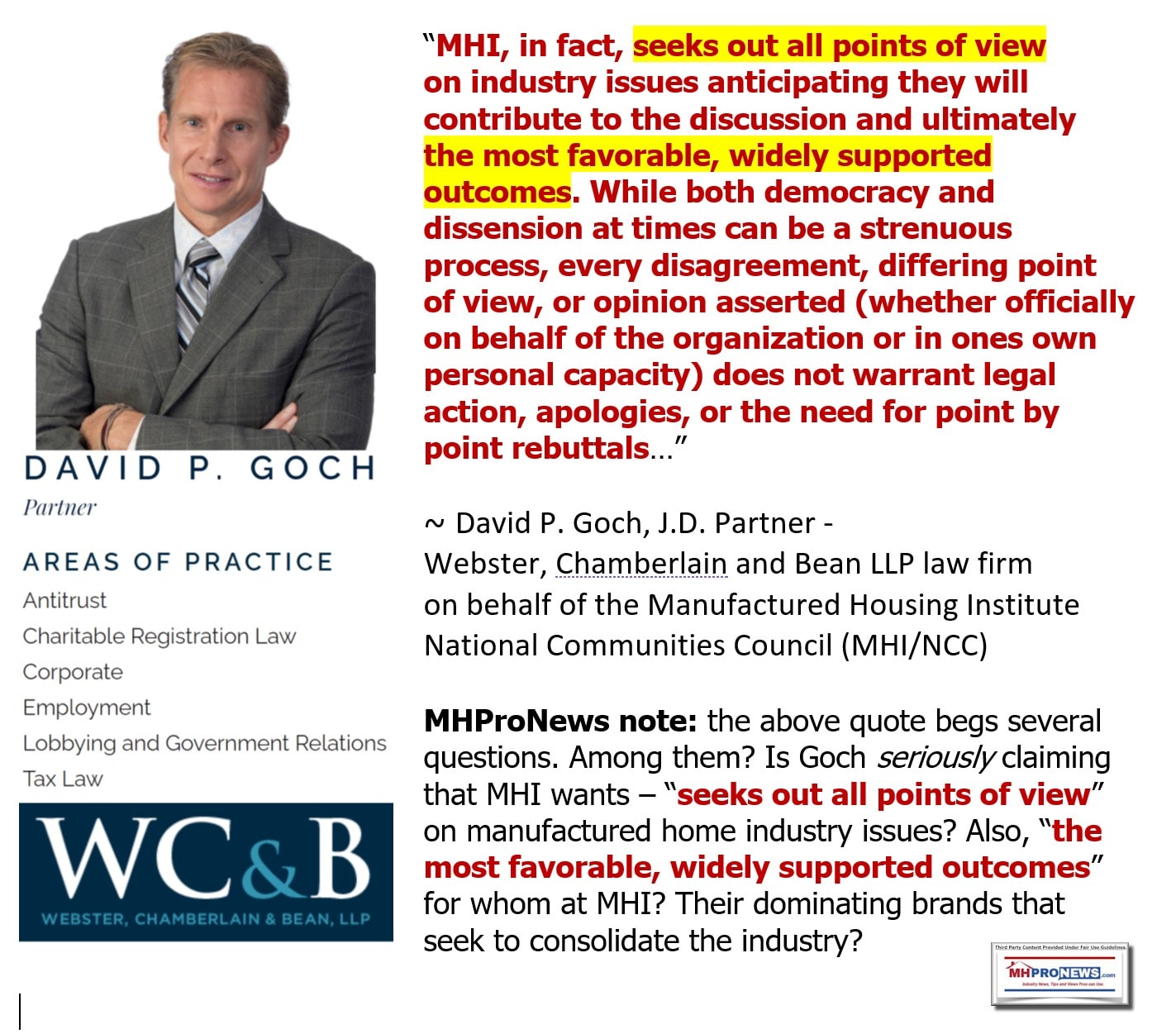
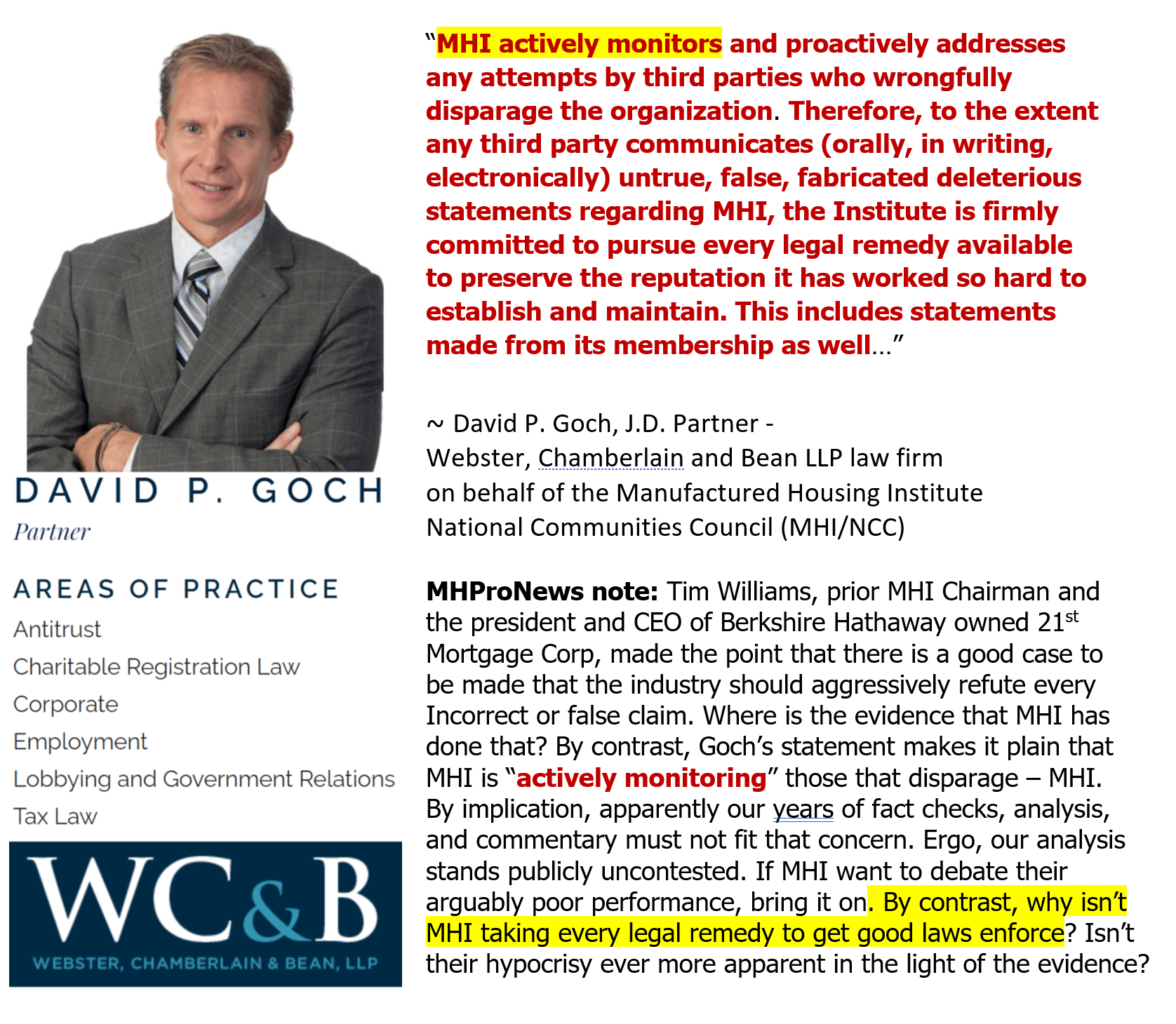
A meandering and often arguably contradictory voice for MHI is blogger George F. Allen.
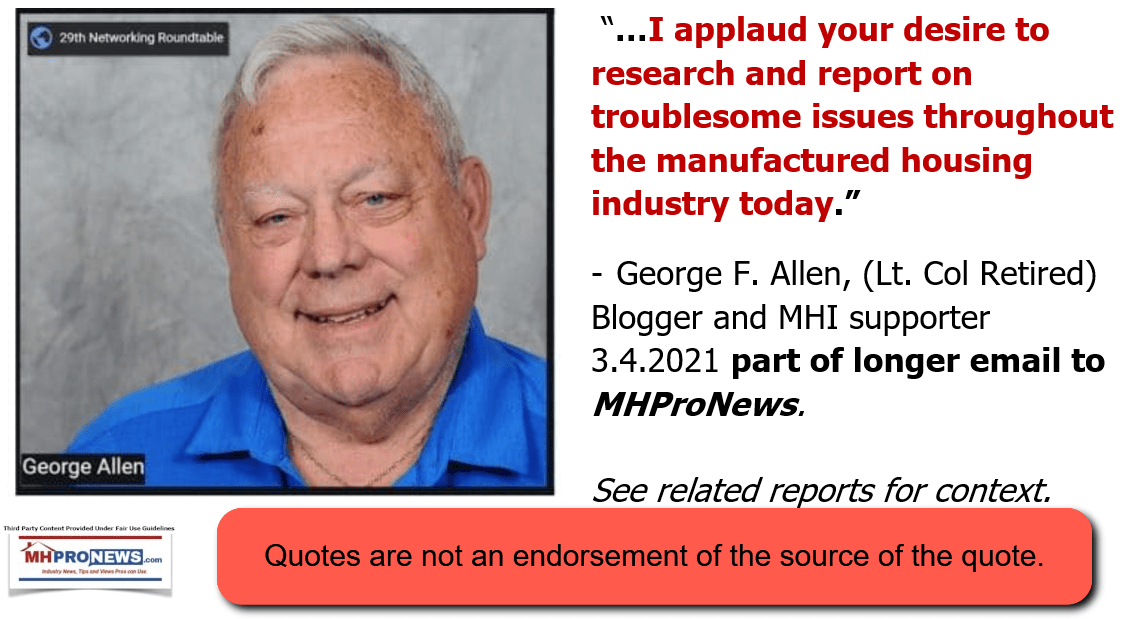
Allen has postured to his relatively smaller audience than MHProNews (which he refers to this publication, but routinely fails to name our publication) and MHARR that each should “put up or shut up” on the need for a post-production trade association that works for the interests of independents.
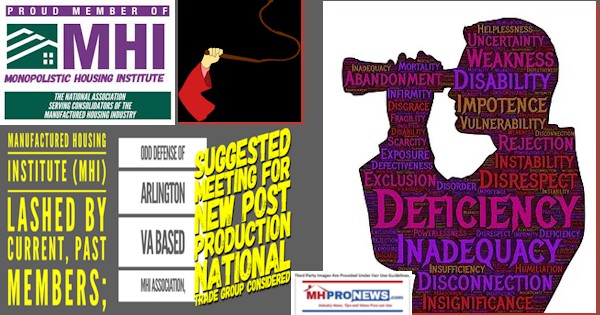
Allen admits that there are numbers of MHI members frustrated by MHI’s behavior.
What Allen doesn’t do is aim his limited influence on the proper and logical target. Logically, if MHI is failing the interests of MHI’s own independently owned members, which Allen has all but admitted to (see the linked report above), then it is MHI who should be the target of his efforts. If Allen is correct in saying MHI members are frustrated, then it is MHI who should “put up or shut up” by doing what they have long claimed. After all, logically, MHI are the ones making what critics claim is are bogus statements. Among them, that MHI says the represent “all segments” of the industry. If so, then they have an unfunny way of showing it. In that light, what Allen seems to be doing is acting as a devilish foil for MHI, a catspaw. His arguments are a red herring, meant to distract from the real issue and the real source of the problems. MHI (and Allen’s) failures each come to light when the history of claims and deeds are examined.

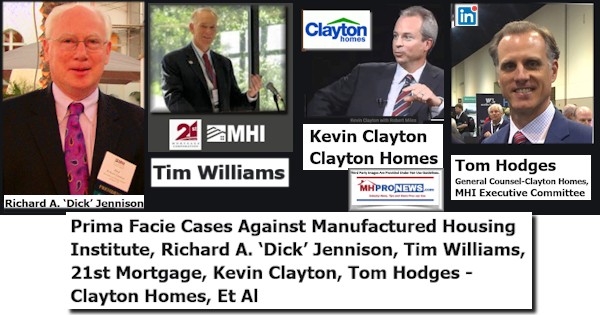
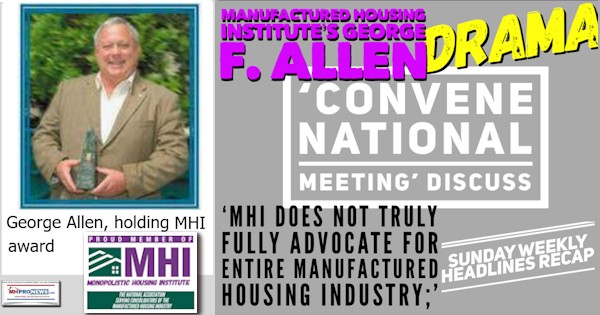
Neither MHI nor Allen can have it both ways.
- Allen has arguably subverted past efforts to establish a post-production trade group.
- He has postured himself, for a time, as being a de facto post-production trade group leader.
- But like MHI events, Allen’s meetings are feeding grounds or fodder for consolidators. The case can be made that MHI and Allen are colluding (by accident or design) to divert and divide the industry’s independents who will soon face new headwinds on top of the existing and developing woes.
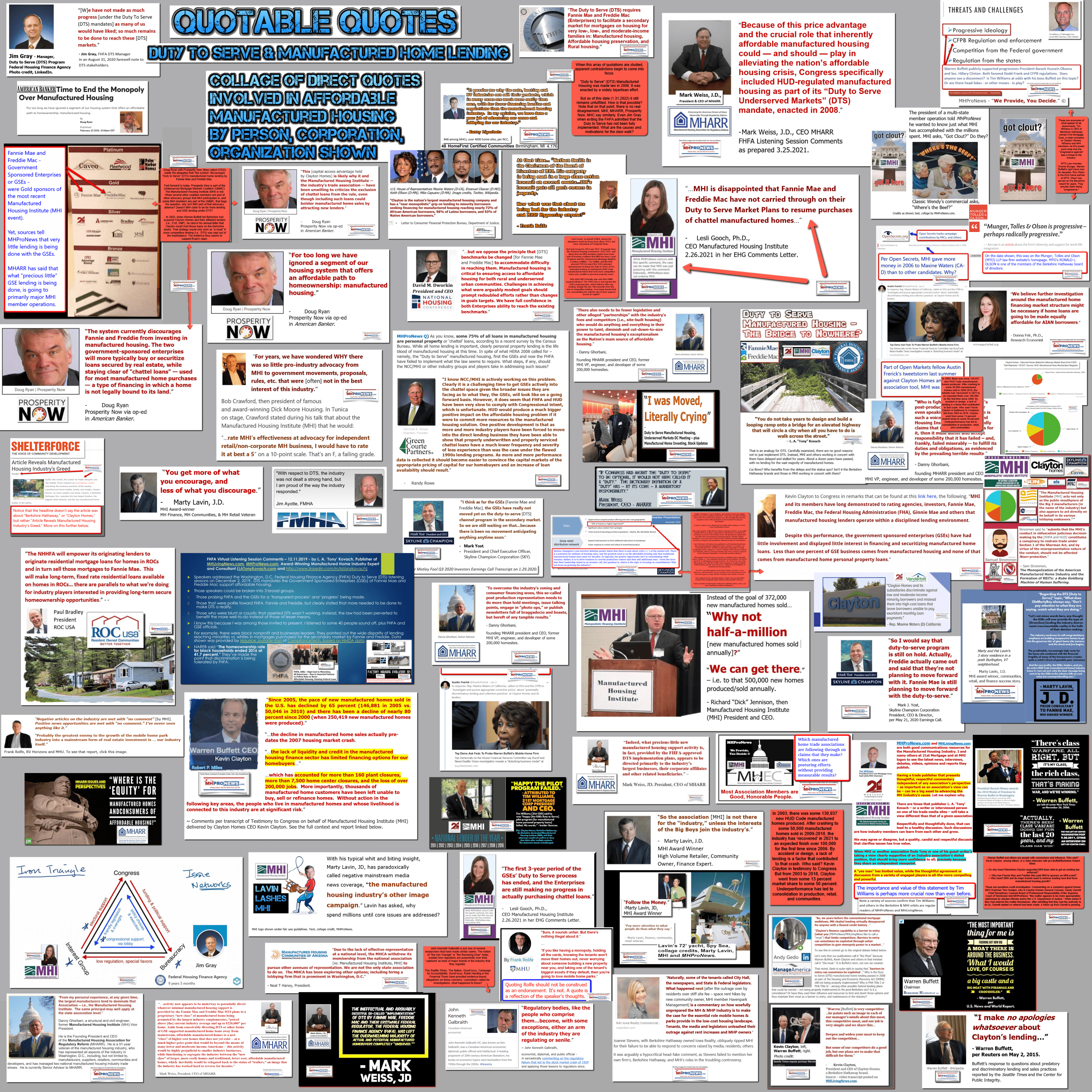
MHI teamed up with MHARR to enact the 2000 Reform Law. MHI sang the praises of MHProNews and MHLivingNews, until our polite but relevant questions apparently became too uncomfortable for their leaders. Instead of encouraging the robust dialogue, as attorney Goch claimed (see quote above), what did actually MHI do? They sought to bar this platform and writer from MHI and their connected trade association events. Note that MHProNews asked those relevant questions about MHI’s odd behavior – seemingly disconnected as outlined herein from their stated claims and aims – while MHI and some of their dominating brands were sponsors. MHI posted signs at MHI meetings that insiders said were aimed at our platforms, and other outside media that may not present them in an angelic light.
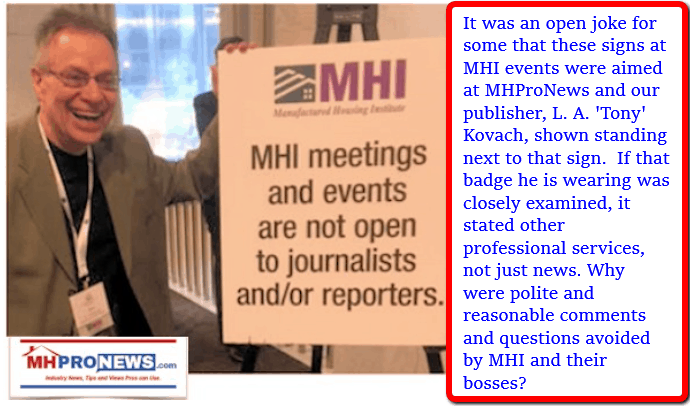
Back to the present and near future. It is an open question if MHI will step up to the plate by using legal resources alongside their other postured efforts. If MHI wants to try passing a new bill, let them try. If MHI wants to try to persuade HUD to stop the DOE energy rule, let them try. But they should no longer delay in implementing a legal response. Their own comments have explained the legal basis for a challenge. So, some of the foundational legal work needed to initiate a suit is already done.
If MHI fails to engage legally, then MHI top staff and board members may face their own legal and conflicts of interest problems. They may face personal liability for their failures to act on behalf of “all segments” of the industry. They have a fiduciary duty, say legal experts, to work for all interests. They also have – through their published statements and claims – placed themselves in a possible perjury trap and antitrust trap too.
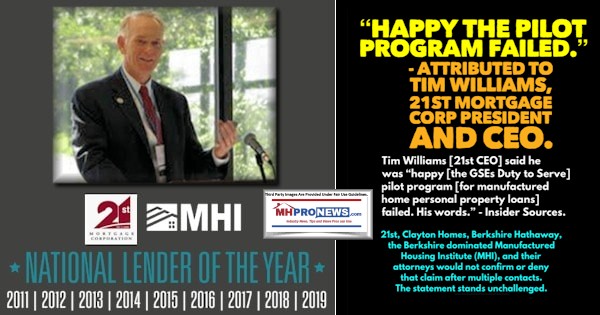
If MHI sincerely pivoted and did all that is necessary to meet their posturing and claims, no one would cheer louder – as our goal from early on in our publishing history has been to support robust growth with good consumer relations. That was quite in keeping with the sentiments of prior MHI President and CEO Chris Stinebert’s exit message. MHI’s own members include one that blasted the organization in a profanity laced tired that included the charge that they are ’empowering f-cking greedy, selfish leaders’ that have ‘made MHI a tool for themselves.’ See that linked below.
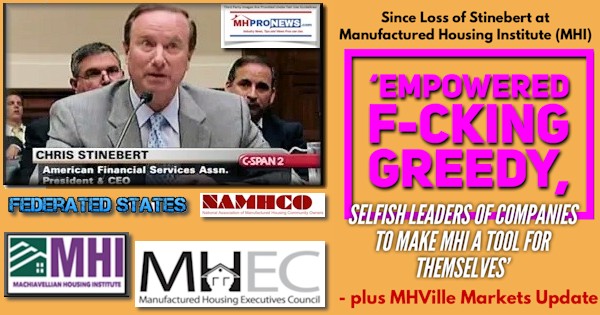
Ghorbani referenced Congressional oversight. He could also reference MHI’s ability to contact GAO, or inspector generals in the various public agencies that regulate aspects of manufactured housing in a similar oversight capacity. For strategic thinkers, MHI is vulnerable on several levels. Some of their big brands and leaders are too. When Ghorbani says the industry needs fighters, that could be applied in a range of ways. For instance, if MHI won’t fight on behalf of its independent members, as they claim, then those independents ought to turn to public officials and other sources to hold MHI and their board members accountable. MHI can’t have their cake and eat it too, unless their smaller members allow them to do so.

Or, perhaps MHI could do what they claim and avoid such a battle. If MHI pressed these 3 big issues Ghorbani and MHARR’s Mark Weiss have correctly raised – instead of in a merely putting on what Ghorbani calls a “dog and pony show” – in the media. MHI has for too long failed to do any of these potentially game-changing steps. That begs the question of their sincerity and their true intentions.
But at the same time, the looming problems that MHARR – and ironically, MHI – are warning about may at some point place some their leaders logically into a vice. Their self-contradictory behavior and claims are being exposed by reports and viewpoints/editorial commentaries like this one. They can no longer merely trust that their followers who will wake up one day and realize that they were stiffed won’t turn to class action or other plaintiffs attorneys. Some of whom will work on a contingency fee basis, to file claims over harm caused by false advertising, market manipulation, perjury, antitrust, fiduciary, or other legal issues.

Time will tell if MHI does what is logical or if they continue to act on behalf of consolidators while posturing and paltering something different.
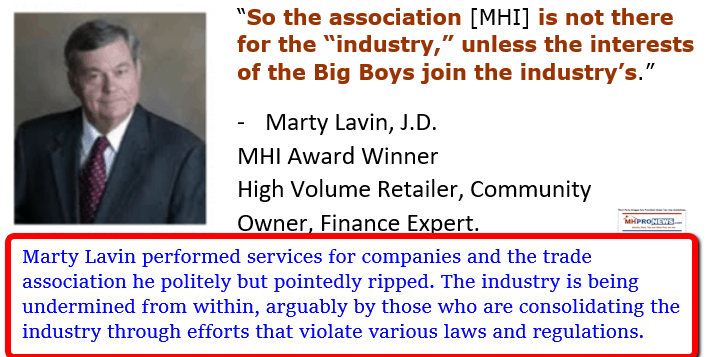
So, a proverbial wall is looming. Even the MHI member Texas Manufactured Housing Association (TMHA) is saying that a slowdown in retail is seemingly emerging.
MHI can’t have it both ways.
- They can’t be this claimed champion of the industry with marvelous access to public officials, legal, and media resources and then fail at every turn to do what is logical for the industry at large.
- MHI members can’t complain about some things not occurring, and then merely accept MHI doing nothing differently.
The definition of insanity is to do the same things the same way and expect a different result. Is MHI insane? Are their unhappy members fearful or are they missing the big picture?
Soviets, Chinese Communists, and Nazis fascists all have used the big lie with effect. The big lie has been used in the USA too. The case can be made that MHI is a small part of a big lie. Corporate powers in the USA are steadily consolidating several industries, the Biden White House is correct about that claim. But like MHI, the Biden White House is apparently paltering – because it is corporate powers that put Joe Biden into the Oval Office in the first place.
Americans are waking up. There are reasons to believe that manufactured home professionals are waking up too. Paltering has worked for years, but sooner or later, the Abraham Lincoln maxim will kick into effect.
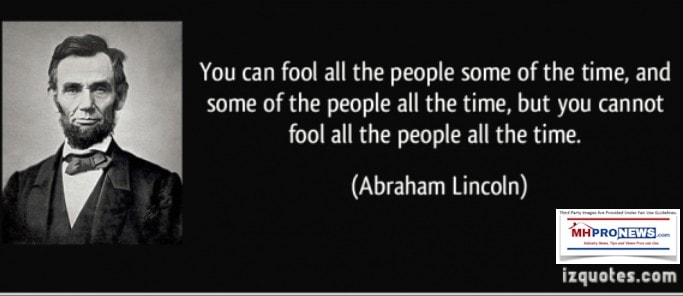
Ghorbani and MHARR’s Mark Weiss are each correct in their assertions. MHI is at the end of a runway. They are not at take-off speed. They will either have to turn their craft around, and start a serious effort, or their leaders will be exposed as bold frauds or inept fools. MHProNews doesn’t think those leaders are foolish people, they are seasoned and intelligent pros. Which leaves the troubling Occam’s Razor conclusion that they are bold frauds.

Once the con is exposed, members of a con have only a few options. They must attempt to pivot, or they may have to suffer the consequences of their confidence game. America has seen Enron, WorldCom, Madoff, and Theranos to name but a few big corporate cons that seemed to be successful for years. Some of those people went to prison. Some paid big fines. But before they were finally taken down by the steady pressure from evidence-based critics, those same brands seemed to be untouchable. There are lessons for manufactured housing in those exposed corporate scams. Some of them may well apply in manufactured housing. With the SEC legal action underway against Cavco Industries, there are reasons to think that the crack in the ice may have already begun.
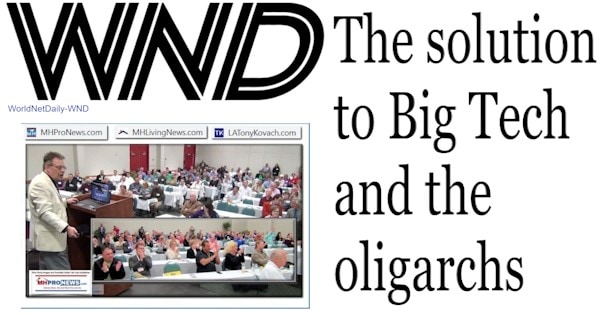
need to wait years for legislation that in the past has often led to little or no discernable benefit. https://www.wnd.com/2021/05/solution-big-tech-oligarchs/
The clock is ticking. MHI and its corporate/board leaders are arguably exposed.
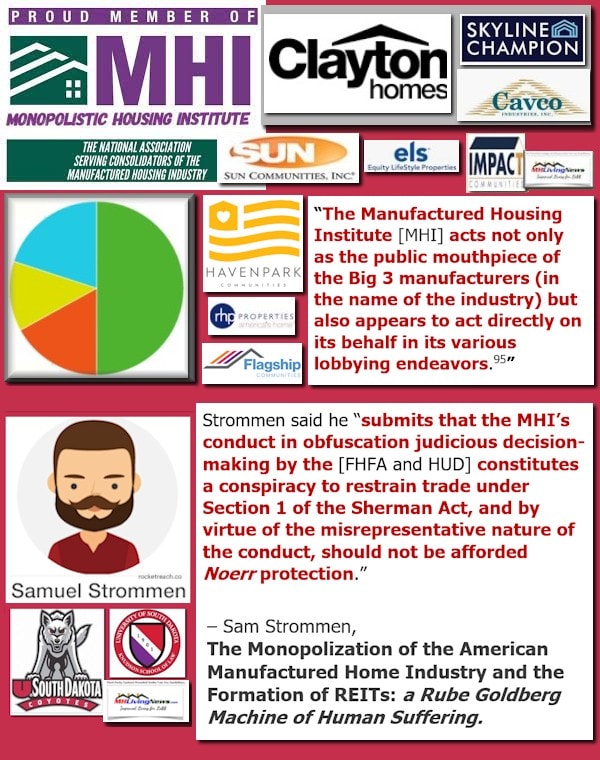
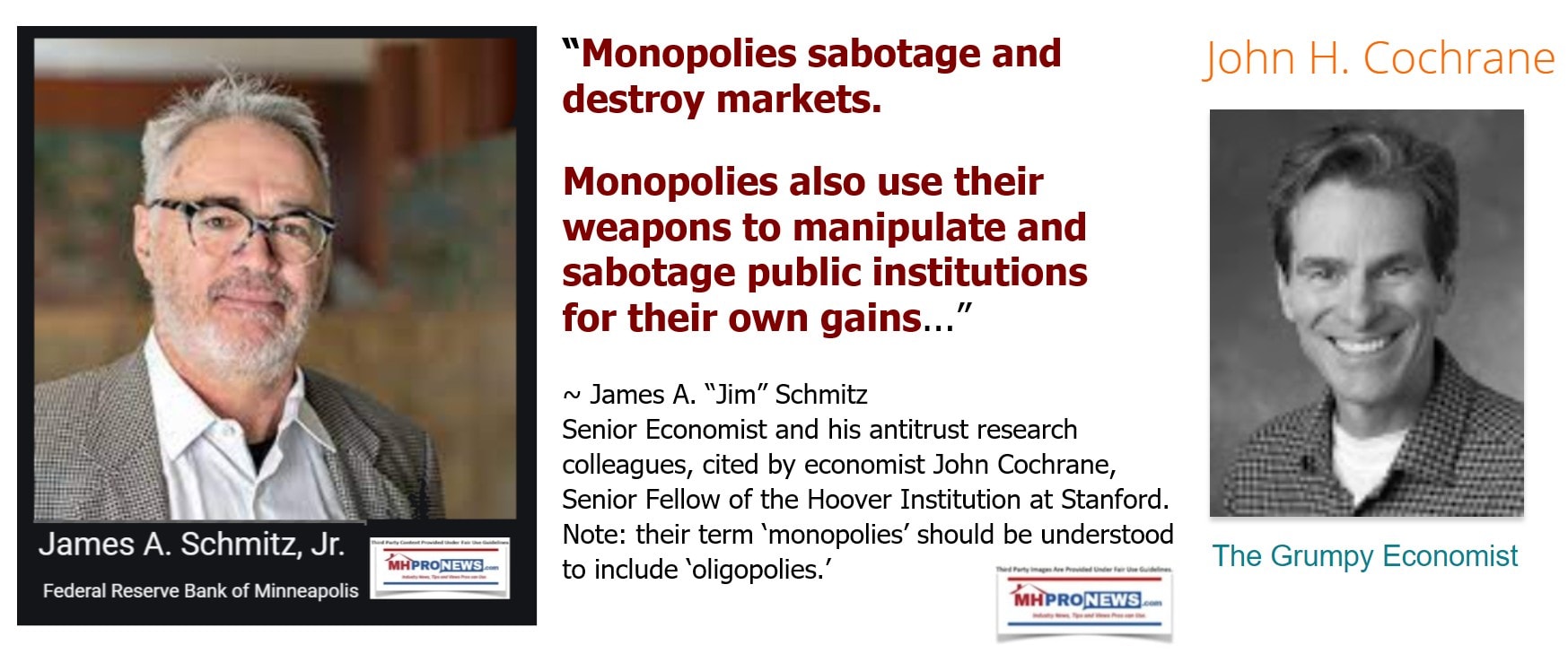
Stay tuned to what’s next from your only demonstrated sources for accountability-minded manufactured housing “Industry News, Tips, and Views Pros Can Use” © where “We Provide, You Decide.” ©
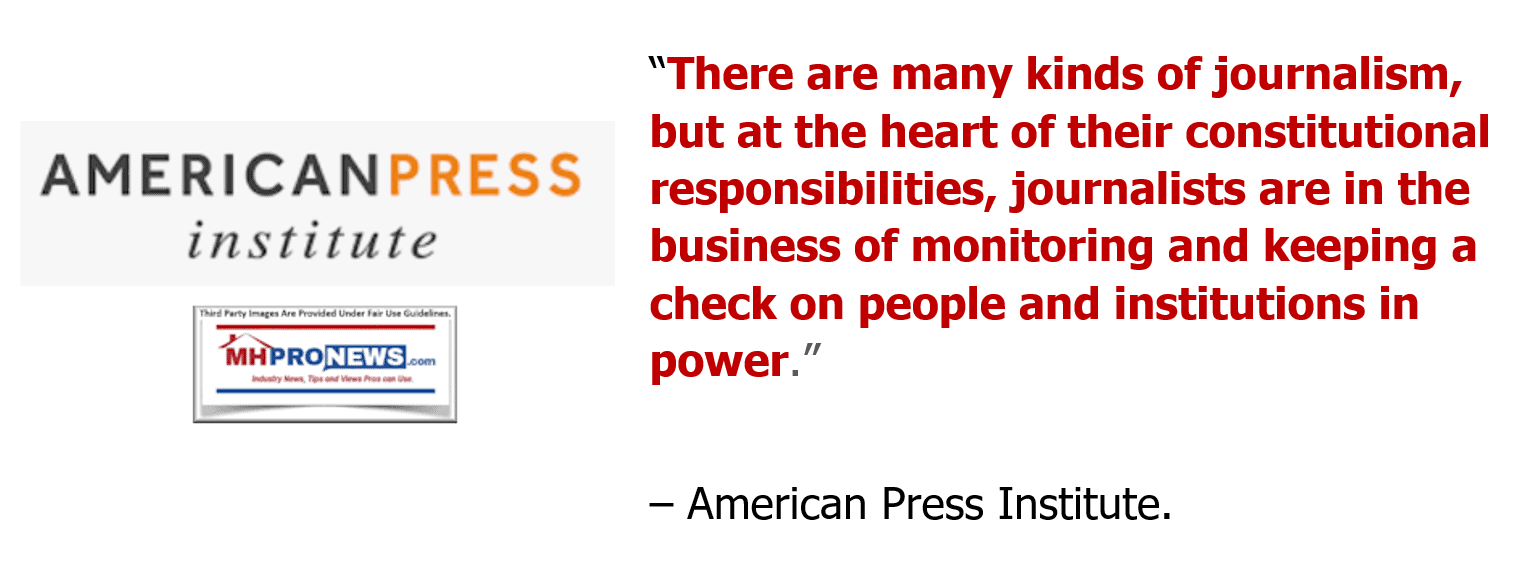

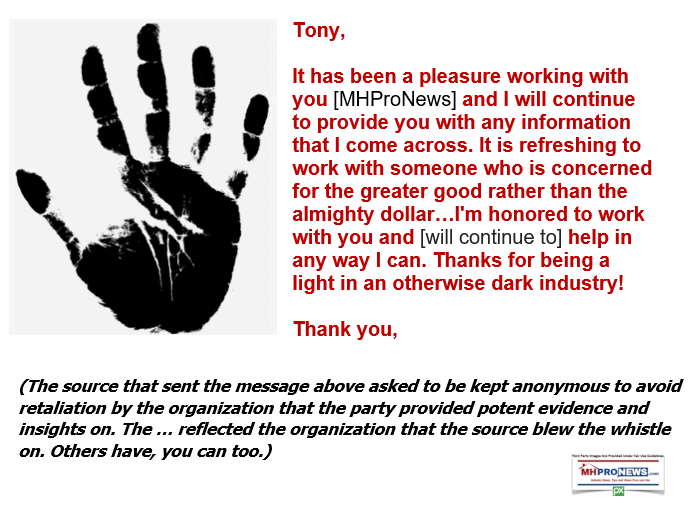
Again, our thanks to you, our sources, and sponsors and God for making and keeping us the runaway number one source for authentic “News through the lens of manufactured homes and factory-built housing” © where “We Provide, You Decide.” © ## (Affordable housing, manufactured homes, reports, fact-checks, analysis, and commentary. Third-party images or content are provided under fair use guidelines for media.) (See Related Reports, further below. Text/image boxes often are hot-linked to other reports that can be access by clicking on them.)

By L.A. “Tony” Kovach – for MHProNews.com.
Tony earned a journalism scholarship and earned numerous awards in history and in manufactured housing.
For example, he earned the prestigious Lottinville Award in history from the University of Oklahoma, where he studied history and business management. He’s a managing member and co-founder of LifeStyle Factory Homes, LLC, the parent company to MHProNews, and MHLivingNews.com.
This article reflects the LLC’s and/or the writer’s position, and may or may not reflect the views of sponsors or supporters.
Connect on LinkedIn: http://www.linkedin.com/in/latonykovach
Related References:
The text/image boxes below are linked to other reports, which can be accessed by clicking on them.
